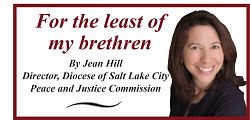Adequate Housing is a Prerequisite for a Life of Dignity
What is a home? Who deserves shelter? As these questions are addressed across our state, Catholic teaching has some very clear answers.
Solidarity with people in poverty is an integral part of our baptismal call. Scripture is explicit about caring for the poor in general and, among other works of mercy, feeding the hungry and sheltering the homeless specifically. It is also clear that “the poor will always be with us” – something our church understands, but some in our secular society tend to forget, preferring quick “solutions” that tend to move poverty out of sight, and therefore out of mind, rather than move people out of poverty.
In Catholic teaching, any solution begins with recognition that every person has dignity and equal value. No matter what struggles a person faces – poverty, addiction, mental health, physical health or any other impediment to personal growth – that person deserves whatever is necessary to lead a fully human life. In the United States, those needs include housing, access to clean water and safe, healthy food, employment, education and health care. We understand that until a person is safely housed, education and employment may take a back seat, as may seeking health care or overcoming addiction. In our teaching, everyone deserves shelter, especially if there are other issues they need to address to stay successfully housed.
When we talk about safe housing as a prerequisite for a life of dignity, our teaching refers to what would be considered housing in the country in which we live. In the U.S., few of us would be our most productive selves if we weren’t sure where we would be sleeping each night or if our sleeping arrangements involved a bunk bed in a room full of dozens of other people. Emergency shelter is a much-needed resource, but it isn’t housing designed to help individuals and families feel secure enough to pursue other needs, such as employment or education.
We also profess equal value for all. Thus, a person with limited income should not be forced into substandard housing. For some people with little to no income, tiny homes and hotels or motels converted into longer term shelter may be the perfect home. Several successful tiny home villages are making news as potential solutions to the desperate need for deeply affordable housing. These communities offer exciting potential and are worth pursuing. But tiny homes are not for everyone. Often, these communities have shared kitchen and shower facilities. While such arrangements work perfectly for some residents, others may have very good reasons to require their own shower or kitchen facilities and need a home with these amenities.
The same is true for hotels or motels converted into “housing.” There are a number of individuals for whom such housing is all they need. But for someone with severe abuse or trauma in their past, spending every day in a hotel room may cause more harm than good. Anyone who has experienced the paper-thin walls of a hotel will understand why, for example, someone whose childhood involved loud, angry noises from abusive adults in their lives might find the constant noise of neighbors on all sides distressing.
Both tiny homes and hotel/motel conversion are an important part of the housing equation, but neither will solve homelessness. Our teaching best explains why: Every human person is unique. Their different paths into and out of success, addiction or homelessness require a variety of housing options and resources to ensure that each person is able to access whatever they need to be successful in staying housed. This doesn’t mean a person can claim they need a 6,000-square-foot home, but it does mean those at the lowest incomes should have housing choices that fit their basic needs, just as those at higher incomes do.
Consistent with Catholic teaching, our homeless services system strives to place people in the right housing situation for them, understanding that when a person’s basic needs are met, they are better able to concentrate on other areas of their life that may be impeding their ability to reach their full human potential.
Jean Hill is director of the Diocese of Salt Lake City Office of Life, Justice and Peace. Contact her at jean.hill@dioslc.org.
© Copyright 2024 The Diocese of Salt Lake City. All rights reserved.


Stay Connected With Us